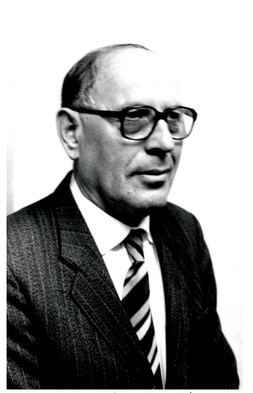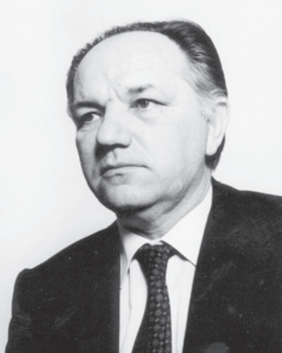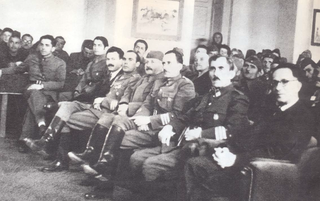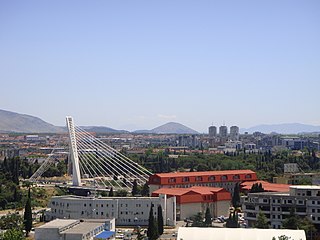
Vojislav Nikčević was a Montenegrin linguist.
Movement for Changes is a right-wing populist and far-right political party in Montenegro. Its current leader is Nebojša Medojević, the party's founder.

Yugoslav Radio Television was the national public broadcasting system in the SFR Yugoslavia. It consisted of eight subnational radio and television broadcast centers with each one headquartered in one of the six constituent republics and two autonomous provinces of Yugoslavia.
Radio and Television of Montenegro is the public service broadcaster of Montenegro. A state-owned company with its headquarters in Podgorica, it is made up of the Radio of Montenegro and the Television of Montenegro.

Božina M. Ivanović was a Montenegrin anthropologist and politician. He served as General Secretary of the Montenegrin Academy of Sciences and Arts and President of Matica crnogorska. He was a professor at the Faculty of Science and Mathematics, University of Montenegro.

The First League of Montenegro is the top professional football league in Montenegro. Founded in 2006, competition is headed by the Football Association of Montenegro. 10 teams participate in this league. The winner of the Montenegrin First League starts the qualifications for the UEFA Champions League from the second round. The second and third placed teams and Montenegrin Cup winner play in the qualifying rounds of the UEFA Conference League. The last placed team is directly relegated to the Montenegrin Second League, and the two next lowest ranked teams play in Montenegrin First League playoffs.
Television in Montenegro was first introduced in 1956. This is a list of television channels that broadcast in Montenegro.

The State Anti-fascist Council for the National Liberation of Montenegro and Boka was formed as the highest governing institution of the anti-fascist resistance movement in Montenegro, in the former Kingdom of Yugoslavia.
Argentine Montenegrins are people born in Argentina of Montenegrin descent. During the early 1900s, Montenegrins from the Kingdom of Montenegro began emigrating to the country, and nowadays there are approximately 50,000 Montenegrins and descendants living in Argentina. Besides Poles (450,000) and Croatians (440,000) they are one of the most populous Slavic communities in Argentina. Currently most of them are located in the northern province of Chaco, while the remaining part lives in Buenos Aires, Tandil, Venado Tuerto, and General Madariaga.

The Montenegro women's national volleyball team is the national team of Montenegro. It is governed by the Volleyball Federation of Montenegro and takes part in international volleyball competitions.
Yugoslavia participated for the last time in the Eurovision Song Contest 1992, held in Malmö, Sweden as the Federal Republic of Yugoslavia. The last Yugoslav representative was Extra Nena with the song "Ljubim te pesmama".

The University of Montenegro Faculty of Economics is one of the educational institutions of the University of Montenegro. The building is located in Podgorica, next to the Faculty of Law and the Faculty of Political Sciences building. The Podgorica School of Economics is Montenegro's leading educational institution in business end economics.
The University of Montenegro Faculty of Philosophy is one of the educational institutions of the University of Montenegro. The building is located in Nikšić, close to the city center.

The University of Montenegro Faculty of Electrical Engineering is one of the educational institutions of the University of Montenegro. Its main building is located in Podgorica, at the University campus.

The University of Montenegro Faculty of Law, also known as the Podgorica Law School, is one of the educational institutions of the University of Montenegro. The Faculty is Montenegro's leading law school.
Montenegro participated in the Eurovision Song Contest 2013 with the song "Igranka" written by Đorđe Miljenović, Dejan Dedović and Mario Đorđević. The song was performed by the duo Who See, which were internally selected by the Montenegrin broadcaster Radio i televizija Crne Gore (RTCG) to represent the nation at the 2013 contest in Malmö, Sweden. Who See was announced as the Montenegrin representative on 20 December 2012, while their song, "Igranka", was presented to the public in a television special titled Who See Igranka on 14 March 2013.
Darko Šuković Cyrillic: Дарко Шуковић, born in Pavino Polje, is a Montenegrin journalist. He is the owner and editor in chief at Radio Antena M and at the news website Portal Antena M. He is also the editor and host of the TV talk show Živa istina.
RTV Cetinje is the local public broadcaster in Cetinje, Montenegro. It broadcasts and produces news, cultural and sports programming through radio and the Internet.
It's the oldest electronic broadcaster in Montenegro, founded on 27 November 1944.
RTV Cetinje has three media services - Radio Cetinje, Internet television and Web portal.

Ervin Ibrahimović is a Montenegrin politician serving as the vice president of the Parliament of Montenegro since December 2021 and the current president of the conservative Bosniak Party (BS), minority party representing Bosniaks in Montenegro, succeeding the party founder Rafet Husović in 2021.

Danijela Đurović is a Montenegrin politician. She served as the president of the Parliament of Montenegro from 28 April 2022 to 30 October 2023. She was a vice president of the Socialist People's Party (SNP) from 2017 to 2021.
This page is based on this
Wikipedia article Text is available under the
CC BY-SA 4.0 license; additional terms may apply.
Images, videos and audio are available under their respective licenses.











